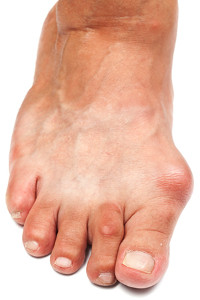 Bunions are typically the result of a bone deformity that affects the toes. The big toe typically leans toward the second toe, and this may cause a bump to form on the bottom of the big toe. Fluid may develop in the surrounding joint, in addition to the skin becoming thickened. This is often a painful condition, and as a result other ailments such as arthritis may develop. Research has shown that it’s beneficial to wear proper shoes that can accommodate the bunion and possibly diminish the pain and discomfort. Relief options may include using adequate padding over the bunion for protection, and wearing shoes that can adjust to the width of your foot. For bunions that have become extremely painful and unmanageable, surgery may be an option to consider. It’s suggested to schedule a consultation with a podiatrist to learn about the best treatment options for you.
Bunions are typically the result of a bone deformity that affects the toes. The big toe typically leans toward the second toe, and this may cause a bump to form on the bottom of the big toe. Fluid may develop in the surrounding joint, in addition to the skin becoming thickened. This is often a painful condition, and as a result other ailments such as arthritis may develop. Research has shown that it’s beneficial to wear proper shoes that can accommodate the bunion and possibly diminish the pain and discomfort. Relief options may include using adequate padding over the bunion for protection, and wearing shoes that can adjust to the width of your foot. For bunions that have become extremely painful and unmanageable, surgery may be an option to consider. It’s suggested to schedule a consultation with a podiatrist to learn about the best treatment options for you.
If you are suffering from bunions, contact Jim Maxka, DPM of South Penn Foot & Ankle Associates. Our doctor can provide the care you need to keep you pain-free and on your feet.
What Is a Bunion?
A bunion is formed of swollen tissue or an enlargement of boney growth, usually located at the base joint of the toe that connects to the foot. The swelling occurs due to the bones in the big toe shifting inward, which impacts the other toes of the foot. This causes the area around the base of the big toe to become inflamed and painful.
Why Do Bunions Form?
Genetics – Susceptibility to bunions are often hereditary
Stress on the feet – Poorly fitted and uncomfortable footwear that places stress on feet, such as heels, can worsen existing bunions
How Are Bunions Diagnosed?
Doctors often perform two tests – blood tests and x-rays – when trying to diagnose bunions, especially in the early stages of development. Blood tests help determine if the foot pain is being caused by something else, such as arthritis, while x-rays provide a clear picture of your bone structure to your doctor.
How Are Bunions Treated?
- Refrain from wearing heels or similar shoes that cause discomfort
- Select wider shoes that can provide more comfort and reduce pain
- Anti-inflammatory and pain management drugs
- Orthotics or foot inserts
- Surgery
If you have any questions, please feel free to contact our office located in Hanover, PA . We offer the newest diagnostic and treatment technologies for all your foot care needs.
